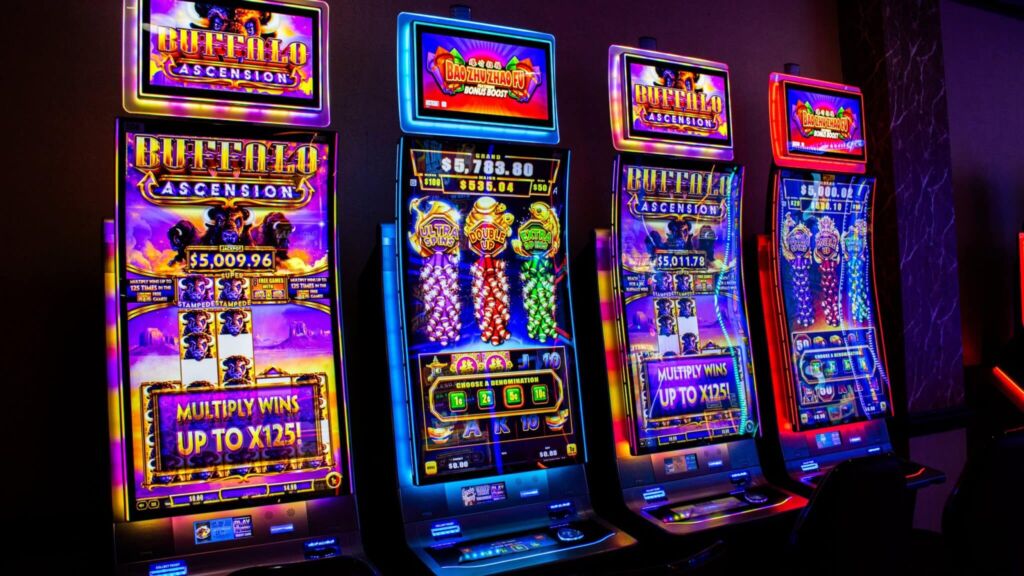Slot machines have firmly established themselves in the gambling world, now on the verge of a groundbreaking evolution. Moving from mechanical components to the cutting-edge realms of VR and AR, these games are set to offer captivating and personalized adventures that seemed impossible in the past. This change isn't just about visual flair but aims to redefine interaction and engagement for players both old and new. As traditional casino goers and tech-savvy audiences collide, VR promises an exhilarating and engaging overhaul of slot entertainment.
Slot Machine Evolution: Journey from Mechanical Gears to Modern Digital Displays
The story of slot machines traces from the intricate gears of the 19th century to today's advanced digital landscapes, highlighting a remarkable path of adaptability and sustained allure. Originally devised as mechanical marvels, these 'one-armed bandits' featured iconic reels and mechanical workings, providing a basic yet thrilling form of play. The pioneering slot, 'Liberty Bell,' crafted by Charles Fey in 1895, presented three reels and five symbols, including the bell, thus rooting its legacy. Wins came from matching symbols on a line, and the straightforward mechanics formed part of its lasting charm.
More than just gambling tools, these early machines became part of the social scene, gracing establishments like saloons and cigar parlors. The mechanical buzz, spinning anticipation, and triumphant bell rings upon win cultivated a unique allure. They embodied a chunk of cultural zeitgeist, intertwining random fortune with social bonding in a burgeoning industrial era - their engineering and social context set the stage for future innovations.
In the 20th century, the dawn of electromechanical slots marked a pivotal era, layering electronic control onto reels for elaborate features like multiple paylines and reward rounds. Notably, 'Money Honey' from Bally in 1964 stands as the first fully electromechanical slot, radically shifting the landscape with its automatic payout features. By supporting quick play and lofty rewards, such machines bolstered player enthusiasm, heralding a new era and cementing slots as gambling cornerstones.
A digital leap in the late 20th century, video slots replaced traditional reels with screens, unlocking endless potential for creativity. Kickstarting with 'Fortune Coin' in 1976, these screens allowed designers to use vibrant animations and immersive gameplay, drawing in a new audience with their visual allure. Though initially met with caution, video slots gained favor, offering vast theme diversity from pop culture licenses to inventive game mechanics, making digital slots more compelling and extensive.
Today's online slots exemplify this expansive journey, bringing the excitement into the digital realm. Offering unmatched ease and broad selection, online platforms have made hundreds of slot games accessible, powered by state-of-the-art technology for fluid play and impressive visuals. As mobile platforms thrive, these slots are accessible on-the-go, reaching a broader global audience and proving their adaptability in matching modern trends and player likes, always striving for an optimized play experience.
Augment Your Gaming with VR: Discover a New Realm of Slot Machine Excitement
As VR makes strides in transforming slots, players can now immerse themselves in lifelike virtual settings, pushing past physical constraints. Envision stepping into a simulated casino, awash with vivid casino sounds and sights, creating an enthralling experience from wherever you are. Gaming transcends mere button pressing to become a journey into a captivating virtual casino landscape.
The step into VR offers an unprecedented sense of authenticity, enabling players to interact with machines as though they were physically present. With innovative graphics and sound, VR blurs reality, letting you physically engage with virtual machines, right down to the feel of pulling a lever or hearing the bright jingle of coins tumbling out. This immersive experience enhances game appeal, drawing players deeper into the spectacle.
VR also unlocks creative potential for game designers, fostering entirely new thematic vistas. Players might find themselves in fantasy lands, historical epochs, or cosmic adventures. Imagine triggering a pirate-themed bonus round, virtually battling foes for treasures, or pursuing sci-fi challenges against celestial backdrops. Creative freedom in VR breaks 2D barriers, creating narratives that rival epic stories.
Social aspects add another layer to VR slots, where social hubs could let players engage with others or friends. Picture sitting in a virtual slots lounge, represented by a digital avatar, betting alongside global players. Shared triumphs and setbacks foster a community spirit, creating a dynamic social gambling environment not seen in conventional digital spaces.
Augmented Reality: Merging Digital Innovations with Real-World Experiences in Slots
Augmented Reality (AR) has the potential to reshape the future of slot machines by merging the digital world with our everyday environments. Unlike Virtual Reality (VR), which immerses users completely in a virtual world, AR introduces digital elements into our reality via devices like smartphones or tablets. In terms of slot machines, this could mean transforming the spaces we inhabit into virtual casinos, without the need for specialized VR headsets. AR leverages the widespread use of smartphones and tablets to offer an innovative way to enjoy slot games, seamlessly blending them into real-world settings.
Picture using an AR application on your smartphone to convert your living room into a casino setting. When you aim your phone at a piece of furniture, like your coffee table, a digital slot machine appears on its surface. You interact with this machine just as you would in a physical setting, spinning the reels with just a tap on the screen. This means AR slot machines combine the ease of online gaming with a fresh visual twist, allowing for a casino-like experience in almost any space. This level of portability and ease of use makes AR slot machines a potentially transformative force in online gaming, appealing to those who prioritize convenience and enjoy gaming on the go.
AR technology can also augment the experience at physical casinos. Imagine pointing your AR-capable device at a slot machine in a casino and having access to real-time stats, bonus options, and social leaderboards that display top scores directly on your screen. AR could enrich traditional casino outings with digital content that informs and engages players. For instance, AR apps could be used to scan machines for exclusive bonuses or personalized game suggestions. This blend of physical and digital appeal might be particularly attractive to tech-savvy younger players who seek interactive and enriched casino visits.
In addition, AR opens up inventive possibilities for casino marketing and promotions both within the casino and beyond. Consider an AR-driven treasure hunt in a casino resort where players use their phones to discover virtual slot machines, each offering unique bonuses or prizes that can be redeemed at restaurants or shows. AR can create engaging virtual tours of the casino floor, highlighting various machines and promotions in an interactive manner. AR technology could even be utilized in advertisements that people can engage with from their homes, giving them a taste of the casino experience and encouraging visits. These approaches could engage new audiences, heighten the entertainment value of casino visits, and provide new marketing pathways.
Beyond VR and AR: New Technologies Influencing Slot Machines
Aside from the excitement around VR and AR, the slot machine industry is being shaped by a host of other emerging technologies. These advancements are set to further revolutionize gaming experiences and progress the gambling sector at large. Some key emerging trends include:
Artificial Intelligence (AI): AI is starting to carve out its space in the online casino domain and is becoming increasingly relevant to slot machines. AI systems can sift through large datasets to deliver personalized gaming experiences, tailoring game dynamics and offers to suit individual tastes. Imagine a slot machine that recognizes your playing habits and adjusts its rewards system to align with your risk appetite, whether you prefer high-stakes or frequent small wins. Moreover, AI can also recommend games that resonate with your preferences based on past play history. Beyond enhancing engagement, AI can play a critical role in promoting responsible gambling, detecting patterns of potential addictive behavior and offering tools and resources accordingly.
Blockchain and Cryptocurrency: The underpinning technology behind cryptocurrencies like Bitcoin, blockchain can bring greater transparency, security, and efficiency to online slots. Imagine engaging with slots that are provably fair, wherein the fairness of outcomes can be independently verified through blockchain, eliminating concerns of game tampering. Additionally, cryptocurrencies can enable faster transactions with lower fees and heightened privacy. New loyalty programs might arise, focusing on crypto rewards that players can trade or use within the casino ecosystem, granting them more control and flexibility. The decentralization aspect of blockchain might also encourage community-led slot game development.
Gamification and Skill-Based Slots: To captivate younger audiences familiar with video games, slots are increasingly incorporating game-like features and skill-based elements. Consider slots that mix traditional gameplay with skill-reliant mini-games, like shooting targets or solving puzzles for bonuses. These elements introduce a level of player involvement and strategy, shifting away from pure chance mechanics. This could include navigating mazes or matching symbols for rewards. Aspects like leaderboards and challenges can foster community and competition, potentially drawing a new demographic of players who enjoy interactive and skillful experiences.
Mobile-First Design and Cross-Platform Compatibility: With mobile gaming on the rise, emerging slot machine designs are increasingly adopting a mobile-first approach. This involves optimizing games for mobile compatibility with smooth performance, touch controls, and adaptability for different devices, ensuring engaging play across various platforms. Whether players are on smartphones, tablets, or desktops, consistency in gameplay and account access is crucial. Imagine beginning a gaming session on your home PC and continuing seamlessly on your phone with progress intact. Mobile accessibility is a primary driver of growth in online gambling, indicating a trend towards focusing on mobile-first game development.
The Intriguing Appeal of Future Slot Machines
Slot machines have remained a favorite among gamblers because they engage various psychological triggers. As these games become more advanced in the future, they will continue to harness these psychological factors even more effectively. It is important to comprehend these psychological elements to truly understand why slots have such lasting allure, even as they become more technologically sophisticated. Game designers deliberately incorporate these psychological aspects into slot machines to ensure players are highly engaged and entertained, but they also contribute to the risk of addiction.
The Illusion of Control: Although slot games are entirely based on chance, they are expertly crafted to give players a sense of control over the outcome. Features such as the skill-stop button, which players can press to halt the reels, offer the illusion of influencing results—even though outcomes are dictated by a random number generator. This sense of agency, although superficial, can make the game more engaging and increase the potential for addiction because players feel they can affect the results. Future versions of slot machines might focus on reinforcing this illusion, possibly by introducing elements that blur the distinction between luck and skill, enticing players to stay engaged.
Variable Rewards and Intermittent Reinforcement: Slot machines use a psychologically potent system of variable rewards and intermittent reinforcement. Wins come sporadically, providing bursts of joy and inducing the release of dopamine, making the experience highly rewarding. This reward system conditions players to continue playing in hopes of the next win. The 'near miss' occurrences, where players come close to winning, imply that victory is imminent, urging them to keep playing. Future slots might enhance these reward mechanisms with advanced visuals and personalized features, making the experience even more tempting. Picture VR slots with dazzling animations that celebrate wins, or AR slots that personalize encouragements, further enticing players.
Sensory Stimulation and Immersion: Slot machines are crafted to be sensory-rich, enveloping players in a captivating atmosphere filled with bright lights and dynamic soundscapes. These sensory features help create an immersive experience that draws players in—a phenomenon often referred to as being in 'the zone.' Future VR and AR slots could intensify this sensation, immersing players in elaborate virtual worlds. Imagine stepping into a VR casino with realistic sounds and bustling crowds, or using AR to blend vivid animations with the real world, enhancing both the visual and auditory stimuli and potentially increasing the game's addictive potential.
Escapism and Entertainment: For many people, slot machines represent a form of entertainment and an escape from everyday pressures. They offer a thrilling chance to win and a brief respite from daily routines. VR and AR slots, with their immersive environments and interactive narrative elements, could amplify this allure. Envision a VR slot game that transports players to enchanted lands, providing a temporary escape, or AR games that bring an engaging gaming experience right into people's homes. As these machines evolve, they are set to offer increasingly personalized and compelling entertainment experiences, allowing players to lose themselves in digital escapism.
Challenges and Considerations for the Future of Slot Machines
As new technologies like VR, AR, and others become integral to slot machines, they bring a host of considerations and challenges for the gambling industry, regulators, and players. Addressing these challenges carefully is essential for the responsible evolution of slot machines that benefits all parties and minimizes potential negative outcomes.
Responsible Gambling and Addiction Concerns: With slot machines becoming more complex and psychologically engaging, the issues surrounding responsible gambling and addiction will likely become more pressing. VR/AR slots create enhanced sensory experiences and illusions of control, which combined with AI personalization, might cater too adeptly to individual player weaknesses, potentially exacerbating gambling issues. For instance, VR casinos might make it more difficult for players to take breaks or be fully aware of their losses. To counteract these risks, the industry and regulators need to focus on developing robust measures for responsible gambling, such as tracking systems to flag at-risk players and VR platforms offering tools like spending limits. Balancing technological innovation with player safety is critical for the future development of slot machines, requiring collaboration across different sectors.
Regulatory Frameworks and Legal Adaptations: The swift advancement of slot machine technology challenges existing regulatory systems, which mainly address traditional or early online gambling. Regulators must adapt to new forms of gambling that involve VR, AR, blockchain technology, and skill-based components. This adaptation might include revising licensing norms and creating specific standards for immersive games to ensure player fairness and safety. Challenges like verifying player ages in virtual environments or monitoring responsible gambling behaviors require international cooperation and guidance. Moreover, the legal definitions distinguishing gambling from gaming might require updates to address skill-based elements, gaming narratives, and how these align with legal viewpoints on entertainment versus gambling.
Accessibility and the Digital Divide: The exciting potential of VR and AR technology in gaming also brings to light significant issues around access and the digital divide. Although the price of VR headsets and AR-capable devices is decreasing, they remain relatively costly, which might exclude individuals, especially those from economically disadvantaged areas or developing nations. To ensure that everyone can benefit from these gaming innovations without exacerbating existing disparities, the industry should consider developing cost-effective VR/AR solutions, such as web-based VR platforms or more budget-friendly AR apps. Additionally, digital literacy and access to a stable internet connection are essential to fully engage in the future slot machine landscape. Bridging the digital divide and promoting digital inclusivity are crucial, so all individuals, regardless of their financial situation or location, can enjoy these technological advances.
The Blurring Lines Between Gaming and Gambling: The introduction of gamification and elements requiring skill into slot machines is starting to blur the line between traditional gambling and video gaming. This fusion results in a new form of entertainment that brings together aspects of both worlds, raising questions regarding the appropriate classification and regulation of these hybrid games. If skills determine game outcomes significantly, should they be regulated under gambling laws or treated like video games, which generally face fewer regulatory demands? Crafting regulatory frameworks that protect consumers while fostering innovation is critical. Clear distinctions between gaming and gambling would prevent loopholes and protect users from potential gambling harms. This situation calls for a more sophisticated regulatory strategy that evaluates factors like skill, payout systems, and psychological effects, rather than simply labeling them as either gambling or gaming products.
Conclusion: Embracing the Future of Slots Responsibly
The integration of VR and AR in gaming marks a significant evolution in the world of slot machines. These advanced technologies offer a new dimension to the gambling experience, making it more engaging and interactive, with options for personalization and responsible gaming. Innovations like AI, blockchain, and gamification further enhance this shift, presenting a dynamic environment for slot machine entertainment. Despite challenges like costs, regulatory concerns, and responsible gambling, the allure of VR and AR slots for a wide range of users is evident, offering a richer and tailor-made gaming experience. As these technologies become more widespread and affordable, we will likely see VR and AR increasingly influence the future of slot entertainment, presenting a fresh twist on traditional gambling that's both thrilling and mindful.
External Resources:



